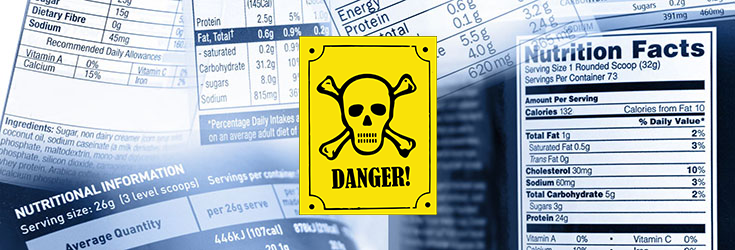Don’t Know What’s in Your Food? Well, Neither Does the FDA.

A massive regulatory loophole allows food manufacturers to add potentially dangerous ingredients to products without the FDA ever reviewing the safety of the additives and, in many cases, without even knowing a company has added them.
These products are permitted in food thanks to a loophole in a decades-old law that allows food companies to add ingredients to their products without first consulting the FDA. The loophole was born in 1958, when President Dwight D. Eisenhower signed the first law regulating ingredients added to food. The law created a system requiring food companies to submit new ingredients to the FDA to review the additives’ safety.
Congress, concerned that the government would waste precious time reviewing the safety of innocuous products like table salt and vinegar, added an exemption to the law to bypass the review process. The loophole allows companies to prove on their own that their ingredients are “generally recognized as safe” (GRAS).
Companies that do choose to allow the FDA to review an ingredient wait an average of two years to hear back from the agency; sometimes, it takes decades. It’s also important to note that the FDA almost never rejects a GRAS determination. To date, only 17 out of 524 notifications submitted to the agency have been rejected. [1]
FDA Database: 93% of Food Additives Aren’t Properly Studied
“It’s a balloon in the shape of a regulator,” said O’Reilly, who specializes in food and drug law. “We have the appearance that there’s a regulator protecting us, but there’s not.” [1]
This is not to say that the government never takes action to rid the food supply of dangerous substances. A loud, public outcry over a widely publicized health threat often makes the agency wake up and take notice, even if it acts at a snail’s pace.
The FDA earlier this month announced that the food industry has three years to phase out the use of partially hydrogenated oils (PHOs), or trans fats, which were once on the agency’s list of GRAS products, but are now known to raise “bad” cholesterol and lower “good” cholesterol. Trans fats, while not immediately dangerous, have been named by public health experts as a contributor to heart disease, stroke and Type 2 diabetes. [1]
There are thousands of lesser-known additives listed under the heading of “GRAS,” many of which have been shown to cause serious, long-term health problems.
Earlier this month, a 38-page petition was filed with the FDA urging the agency to specifically phase out eight synthetic flavorings currently categorized as GRAS: Benzophenone, Ethyl acrylate, Eugenyl methyl ether, Myrcene, Pulegone, Pyridine, Styrene and Trans and trans-2,4-hexadienal.
In Europe, lupin is considered a “major food allergen” and must be labeled as such on packaged foods. Lupin is less common in the United States; however, the ingredient can still be found in products here. Due to the rarity of lupin, the FDA does not require companies to identify it as an allergen on packaged foods, despite knowing about lupin’s effects since at least 2008. [1]
GRAS ingredients are supposed to meet a standard of “reasonable certainty” that they are not dangerous to consume. In order for this to happen, companies must establish that the additive is commonly understood by qualified scientists.
But scientists are not always in agreement on the safety of GRAS additives, and ingredients that have been considered safe for years are now under the microscope as new health information emerges. One example is carrageenan, used in yogurt, ice cream and soymilk to give the foods their thick, creamy texture. Long considered safe, it recently came to light that carrageenan can cause gastrointestinal inflammation in animals and humans.
“We simply do not have the information to vouch for the safety of many of these chemicals,” Michael Taylor, the FDA’s Deputy Commissioner for Foods, told The Washington Post last year.
About 1,000 ingredients have been added to food without FDA review since 1958. The Natural Resources Defense Council (NRDC) calls the process “generally recognized as secret.” Two industry reporters told Center for Public Integrity (CPI) that two-thirds of their safety reviews are never sent to regulators. Truthout reports that one international food company confessed it introduces five new additives every year without informing the FDA.
The threat of lawsuits by companies and industry groups prevents the FDA from requiring food companies to submit basic information from safety evaluations. Unfortunately, the government’s fear of litigation means the general public will remain in the dark about exactly what is in the food they are eating and trusting to be safe.
Additional Sources:
[1] Truth-out.org

Bypassing FDA when adding ingredients is dangerous. On the other hand, FDA itself is dangerous. It’s trying to get rid of certain GRAS items that ARE safe so that FDA’s buck buddies, big pharma and big agri/chem/biotech, can sickness-profiteer, often by making synthetic versions of the natural substances. Let’s make sure that the baby isn’t tossed out with the bath water. Moreover, FDA is way behind on labeling (preferably banning) GMOs and on getting rid of the idiocy declaring that pathogenic GMOs are “substantially equivalent” to real, safe, normal, natural food. FDA has an enormous conflict of interest in dealing with both food AND drugs. Its political appointees should be investigated for corruption and for collusion with the corporations that FDA is supposed to regulate but doesn’t.